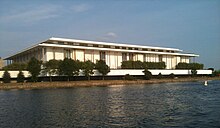Kennedy Center

Kennedy Center seen from the Potomac River
|
|
| Address | 2700 F Street, NW |
|---|---|
| Location | Washington, D.C. |
| Coordinates | 38°53′45″N 77°03′21″W / 38.8957°N 77.0559°WCoordinates: 38°53′45″N 77°03′21″W / 38.8957°N 77.0559°W |
| Owner | United States government |
| Operator | John F. Kennedy Center for the Performing Arts David Rubenstein, Chairman Deborah Rutter, President |
| Type | Performing arts center |
| Capacity | Concert Hall: 2,454 Opera House: 2,294 Eisenhower Theater: 1,161 Terrace Theater: 475 Theater Lab: 398 Family Theater: 320 Jazz Club: 160 |
| Construction | |
| Opened | September 8, 1971 |
| Architect | Edward Durell Stone |
| Structural engineer | Severud Associates |
| General contractor | John McShain |
| Tenants | |
|
National Symphony Orchestra Washington National Opera Suzanne Farrell Ballet |
|
| Website | |
| www |
|
The John F. Kennedy Center for the Performing Arts (on the building itself called the John F. Kennedy Memorial Center for the Performing Arts, and commonly referred to as the Kennedy Center) is a performing arts center located on the Potomac River, adjacent to the Watergate complex in Washington, D.C. The Center, which opened September 8, 1971, produces and presents theater, dance, ballet, orchestral, chamber, jazz, popular, and folk music, in addition to multi-media performances for all ages.
It is the busiest performing arts facility in the United States and annually hosts approximately 2,000 performances for audiences totaling nearly two million; Center-related touring productions, television, and radio broadcasts welcome 20 million more. Now in its 45th season, the Center presents the greatest examples of music, dance and theater; supports artists in the creation of new work; and serves the nation as a leader in arts education. With its artistic affiliate, the National Symphony Orchestra, the Center's achievements as a commissioner, producer, and nurturer of developing artists have resulted in over 200 theatrical productions, dozens of new ballets, operas, and musical works.
Tracing its beginning to the National Cultural Center Act of Congress in 1958, which requires that its programming be sustained through private funds, the center represents a public-private partnership. It is both the nation's public memorial to President John F. Kennedy and the "national center for the performing arts." Its activities include educational and outreach initiatives, almost entirely funded through ticket sales and gifts from individuals, corporations, and private foundations.
Designed by architect Edward Durell Stone, it was built by Philadelphia contractor John McShain and is administered by a bureau of the Smithsonian Institution. It receives federal funding each year to pay for the maintenance and operation of the building.
...
Wikipedia
